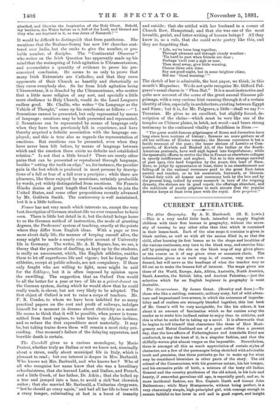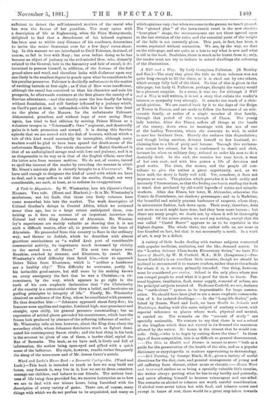The Comeroniana. By James Grant. (Bentley and Sons.)—To those who
like a rattling, romantic, military story, full of wild adven- ture and impassioned love-scenes, in which the extremes of improba- bility and of realism are strangely blended together, this last book of Mr. Grant's will be very acceptable, for like his others, it has about it an amount of fascination which so far carries away the reader as to make him inclined rather to enjoy than to criticise, and this is what he seeks for in taking up a novel. It is afterwards that he begins to tell himself that characters like those of Hew Mont- gomery and Mattei Guebhard are of a past rather than a present day, that the love-affairs of Fotheringhame and Annabelle Errol are conducted, to say the least of it, in a singular fashion, and that the skilfully-woven plot almost verges on the impossible. Nevertheless, there is amongst all this so much appreciation of certain styles of character, not a few of the personages being sketched with admirable truth and precision, that these portraits go far to make up for what may be considered blemishes in other parts of the stork. The old colonel of the Cameronians, with his generous nature, his hot temper, and his excessive pride of birth, a mixture of the testy old Indian General and the country gentleman of the old school, in his bale and hearty, if somewhat garrulous old age, is especially good; and so, in more incidental fashion, are Mrs. Captain Garth and honest John Balderstone ; while Mary Montgomerie, without being perfect, is a very charmingly simple, high-principled girl, with courage enough to remain faithful to her lover in evil and in good report, and insight sufficient to detect the self-interested motives of the rascal who has won the favour of her guardian. The story opens with a description of life at Eaglescraig, when Sir Piers Montgomerie, delighted to find that a detachment of his beloved regiment has been sent to within easy distance of his residence, determines to invite the senior lieutenant over for a few days' cover-shoot- ing. In this manner we are introduced to Cecil Falconer, destined, of course, to fall in love with Mary ; bat even before doing so he has become an object of jealousy to the evil-minded Hew, who, distantly related to the General, heir to the baronetcy and heir of entail, is de- termined to possess himself, in addition, of the fortune of the fair grand-niece and ward, and therefore looks with disfavour upon any one likely in the smallest degree to poach upon what he considers to be 111B peculiar preserves. Falconer is decidedly unfortunate in the matter of exciting hatreds at first-sight ; as if that of Hew were insufficient, although the rascal has contrived to blast his character and ruin his prospects, he afterwards contracts at the first glance the enmity of a Servian adventurer,—and this enmity none the less deadly for being without foundation, and still further inflamed by a jealousy which, on Cecil's part at least, is unfounded,—bids fair to leave him dead on the plains of the Morava, for the unfortunate Falconer, dishonoured, penniless, and without hope of ever seeing Mary again, has tried to find oblivion by serving Prince Milano as a volunteer trooper in " Tchernaieff's Own" regiment, and deservedly gains in it both promotion and reward. It is during this Servian episode that we are served with the dish of horrors, without which a tale of this kind would necessarily be incomplete, although many readers would be glad to have been spared the death-scene of the unfortunate Margarita. The whole character of Mattei Guebhard is that of an undisciplined Ravage mad with love and jealousy, and it is as disagreeable in its way as is that of the English villain, save that the latter acts from meaner motives. We do not, of course, intend to spoil the interest of the reader by revealing the manner in which Mr. Grant's intricate plot is cleverly brought to a deneuemen,. We have said enough to designate the kind of novel with which we have to deal, and it may suffice to add that its merits, though not very 'considerable, are such, at least, as to redeem its exaggerations.



































 Previous page
Previous page